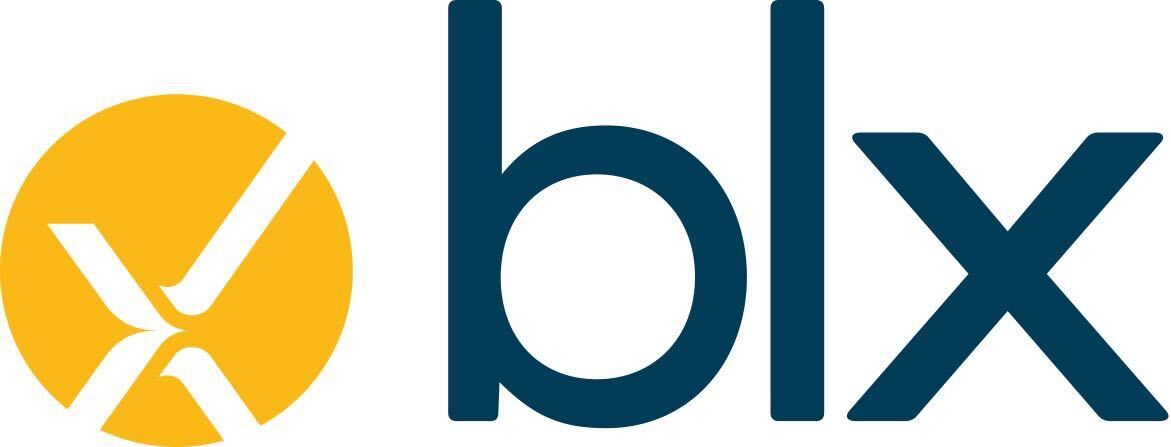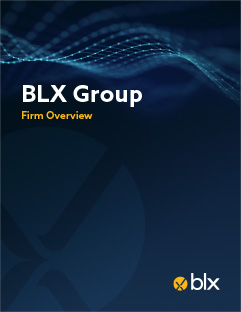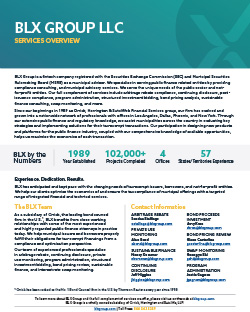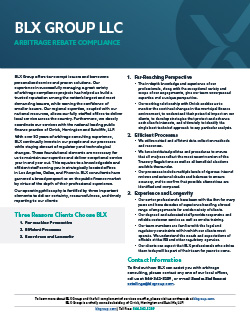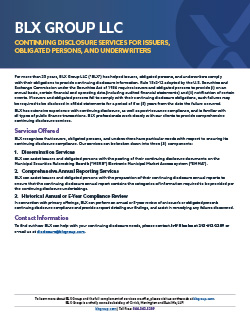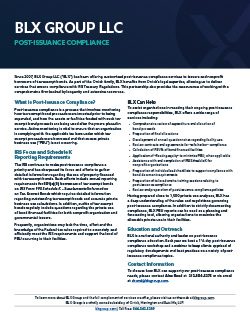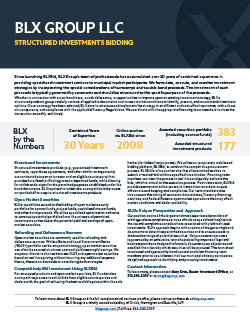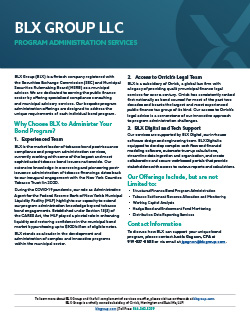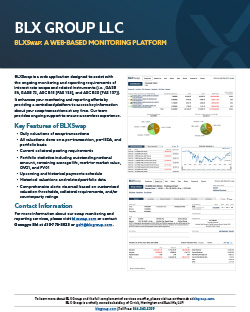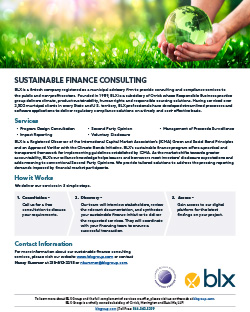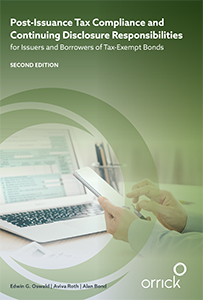The Bond Buyer and Orrick Webinar – Arbitrage Rebate: Navigating Compliance and Maximizing Retained Earnings (Q & A)
(Completed February 29, 2024)
Return to Bond Buyer Webinar: Arbitrage Rebate Page
SPENDING EXCEPTIONS
Is the 6-month spending exception applicable to bond anticipation notes that finance capital expenditures?
Yes.
Are there any special exceptions to rebate or yield restriction for projects that were delayed as a result of COVID?
No, but issuers may want to consult with their tax counsel and arbitrage consultants about depositing unspent proceeds into Demand Deposit SLGS, which are exempt from rebate and yield restriction.
How do the spenddown exceptions apply to draw-down tax exempt loans?
Most draw down loans require the borrower to make draws on a reimbursement basis or to submit invoices that are immediately payable. In these circumstances, proceeds are spent immediately upon the draws, and there is little opportunity to earn interest in excess of the arbitrage yield prior to the proceeds being spent.
How are bond proceeds used to pay capitalized interest treated for purposes of the spending exceptions to rebate?
Proceeds used to pay capitalized interest are included in the amount of proceeds that must be spent to meet the spending exception thresholds.
Is an election to bifurcate the two-year spending exception considered a multipurpose allocation for the issue for all other purposes?
No.
SMALL ISSUER EXCEPTION TO REBATE
May issuers refund multiple bonds that qualified for a small issuer exception to rebate in a single issuance and qualify the refunding issue for the same exception?
Regardless of how many prior bonds are refunded, the refunding issue may only qualify for the small issuer exception if the refunding.
Does the increased limit on the small issuer exception to rebate for public school facilities only apply to K-12, or does it also apply to public colleges/universities?
The increased $15 million limit to the small issuer exception is also available to bonds issued to finance construction of public school facilities at public colleges and universities.
If a school district uses bond proceeds to buy buses , is this part of the $15 million requirement, or only part of the $5 million requirement?
Under the small issuer exception, the increased $15 million limit applies for construction of public school facilities, so no more than $5 million could be expended on non-construction items like acquisitions of buses.
REBATE AND YIELD RESTRICTION
What’s the difference between calculating arbitrage rebate and yield restriction? Are they different calculations?
Yes, they are two different computations. Much of the investment cashflow is the same, however for yield restriction, the bond yield is increased by a permissible spread and the cashflow only relates to the time periods the funds are subject to yield restriction. For example, when calculating yield restriction for new money bonds that qualified for the initial three-year temporary period, the yield restriction calculations would only take into account cashflows after the end of that temporary period (i.e., and not cashflows during the first three years).
When must yield reduction payments be made?
As a general matter, yield reduction payments are due at the same time and in the same manner as rebate payments, with the first yield reduction payment due at the earlier of the final redemption date of the bonds, or the fifth bond year. Also, the yield reduction payment is a direct offset to any rebate payment that might otherwise be due.
Do issuers receive credit for yield reduction payments when calculating rebate owed?
Yes, the yield reduction payment is a direct reduction of any rebate payment that might be due.
Is the computation date credit applicable for annual calculations or only five-year period calculations?
A computation credit is available for each year that there are proceeds subject to the computations, as well as for the final computation date. The computation date credit is not dependent upon frequency of computations.
If an issuer does not create a formal debt service account for the bonds, but it accumulates funds in an internal account prior to paying debt service, is the account subject to yield restriction and rebate?
This depends on the nexus between the funds set aside and the payment of debt service. Funds that merely are preliminarily earmarked to pay debt service, but are not pledged and may be used for another purpose at the will of the issuer, generally are not subject to yield restriction or rebate.
If an issuer sends money to make a debt service payment to a trustee and the trustee invests the money at a yield in excess of the arbitrage yield on the bonds prior to making the payment, are the excess interest earnings subject to rebate?
This depends on whether the amounts sent to the trustee qualify for the bona fide debt service fund exception from rebate. If the amounts sent to trustee do not meet the bona fide debt service fund requirements (proper annual matching of revenues and expenses and annual depletion), then the amounts invested would be subject to rebate. In addition, for certain bond issues, the bona fide debt service fund exception only applies if earnings do not exceed $100,000 per year.
Are more frequent arbitrage calculations recommended even if bond proceeds are expected to meet a spending exception to rebate?
Even if sale proceeds of a bond issue are expected to meet a spending exception to rebate, other amounts could still be subject to arbitrage (debt service funds or reserve funds). Increased frequency of computations is recommended when your arbitrage yield (limit) is less than prevailing investment rates.
Are construction and capitalized interest accounts subject to rebate if funded with taxable bonds?
Taxable proceeds in construction and capitalized interest accounts are not subject to the rebate or yield restriction provisions unless they become replacement proceeds or transferred proceeds of a tax-exempt bond issue.
What are examples of funds that need to be analyzed to make sure they comply with rebate and yield restriction?
Examples of such accounts include construction/project funds, capitalized interest accounts, debt service accounts, debt service reserve accounts, pledged accounts, escrow accounts, etc. Any fund or account that has a nexus to any tax-exempt bond issue should be examined.
How may proceeds of a specific bond series be yield restricted if they are invested as part of an investment pool?
In the absence of the ability to segregate bond proceeds within an investment pool, it may be difficult to ensure that proceeds are yield restricted. If the rate of return on the investment fund is less than the arbitrage yield on the bonds, then the bond proceeds will comply with yield restriction. However, the investment fund will have to be monitored to make sure the rates of return do not rise above the bond yield.
In the alternative, if the bonds qualified for an original temporary period, then the positive arbitrage earned on the pool after the end of the temporary period could be “corrected” through a yield reduction payment.
What do issuers need to watch for when using a pooled debt service fund that pays debt service on multiple bond issues?
Issuers need to monitor whether the fund constitutes a bona fide debt service fund. If it does not, the excess portion will be allocable to all the bonds commonly secured by the fund and may be subject to rebate.
Does requesting a rebate refund trigger an IRS audit?
BLX has never experienced a refund claim triggering an IRS audit. However, the claim and supporting documents will be fully vetted by the IRS prior to granting the claim.
REIMBURSEMENTS
What is the 60-day rule for reimbursements?
The Treasury Regulations allow a 60-day period after an expenditure to adopt appropriate reimbursement documentation. Within 60 days of making a capital expenditure an issuer would like to reimburse itself for out of the proceeds of a later issued tax-exempt bonds issue, a reimbursement resolution or declaration of intent must be prepared to signify that issuers intend to reimburse themselves.
When should issuer not adopt a reimbursement resolution/official intent to reimburse?
The regulations provide that issuers must have a reasonable expectation on the date of the resolution that it will reimburse the original expenditure with proceeds of an obligation. Reimbursement resolutions and official intents declared as a matter of course or in amounts substantially in excess of the amounts expected to be necessary for the project (e.g., blanket declarations) are not reasonable. Similarly, a pattern of failure to reimburse actual original expenditures covered by official intents (other than in extraordinary circumstances) is evidence of unreasonableness.
RECORD KEEPING
What are the record retention requirements?
All records related to a bond issue must be retained for three years after the bonds, or any bonds refunding those original bonds, etc., have been paid in full.
What if an issuer cannot find some of its records relating to a bond issue?
The issuer should discuss this issue with its bond counsel.
STATE AND LOCAL GOVERNMENT SERIES (SLGS)
What is a state and local government series (SLGS) security?
The Bureau of Public Debt established the State and Local Government Series (SLGS) securities in 1972 to assist issuers with the “new” requirement of yield restriction. Only eligible sources of funds may be used to purchase SLGS. The securities are backed by the full faith and credit of the U.S. Treasury. SLGS are issued as either Time Deposit SLGS and Demand Deposit SLGS. See the TreasuryDirect.gov website for additional information.
REFUNDINGS
Do bonds have to be refunded on the first available call date?
Bonds being refunded in a current refunding and bonds being refunded for a reason other than savings do not have to be refunded on the first available date.
Does the source of funds for a defeasance matter for yield restriction purposes?
Yes, generally if the defeasance (or current refunding escrow) is funded with tax-exempt bond proceeds of refunding bonds, the escrow is limited to the yield on the tax-exempt refunding bonds. If the defeasance escrow is funded with cash on hand, then the yield on such escrow is restricted to the yield on the bonds being defeased. If a defeasance escrow for tax-exempt bonds is funded with taxable bonds, the escrow is generally not yield restricted unless the proceeds in the escrow become replacement proceeds of the refunded tax-exempt bonds, such as if the taxable bonds mature while the escrow is outstanding.
For questions, or to discuss how BLX can assist with your organization’s arbitrage rebate compliance, please contact Sandee Stallings, 214-989-2701.
